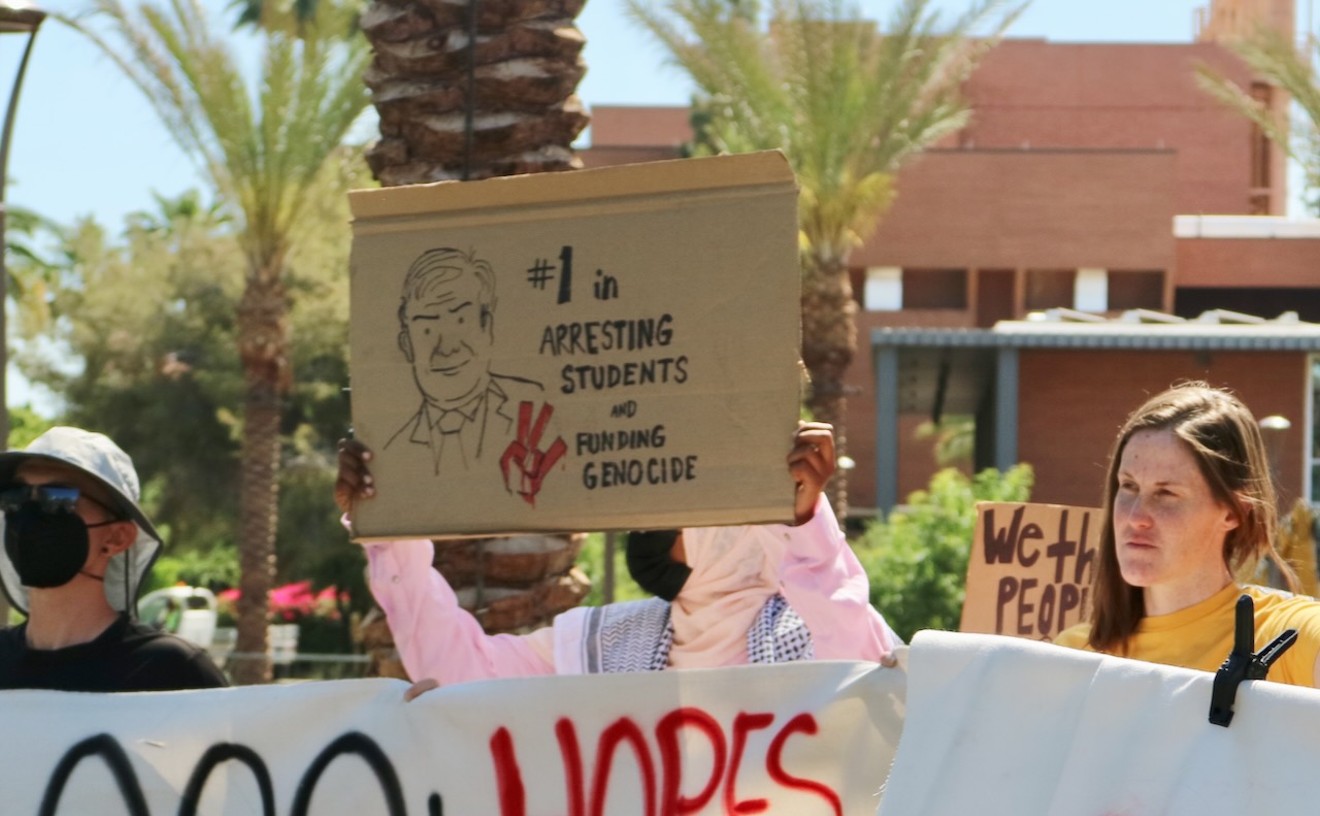David Wilbur Studli's voice sounds disconnected and hollow, like he's calling up from the bottom of a well. He speaks in short, nervous bursts of words that come quickly but still sound flat and murmurous. He is talking on a speaker phone from a room somewhere inside an Arizona state prison. A corrections officer can be heard clearing his throat and tapping away at a keyboard in the background.
"I'm trying to get out of here as soon as I can," Studli says.
He has been an inmate of the Arizona prison system since June 13. A month before that, he was convicted of aggravated assault for threatening his ex-lover with a gun during a spat in which no one was injured. He was sentenced to four years and three months in prison. If he behaves himself, he could be paroled after serving just over two years. His 23rd birthday was last week. The prison unit where Studli currently resides is his fifth. He has been moved four times because of dozens of threats and two actual attempts on his life. His life was threatened because he is gay, and because he is infected with HIV, the virus that causes AIDS.
"They said, 'If the faggot isn't taken off the yard, he'll be dealt with, inmate-style,'" he says.
Studli committed his crime exactly one month after Maricopa County Attorney Richard Romley put his "deadly weapon" policy into effect--in fact, Studli was one of the first people to be tried under it. According to the policy, no one criminally charged with the use of a deadly weapon (that is, a firearm, or one of several types of knives) will be offered a plea agreement that does not include prison time. The many critics of the county attorney's weapons policy--including at least one prosecutor in the County Attorney's Office--say that it has become an unreasonable burden on the thinly stretched county budget; that it is enforced too often when it shouldn't be and not often enough when it should; and that it has wrongly conferred long prison sentences on numerous minor offenders. Minor offenders like David Studli.
In most criminal cases, the American justice system allows prosecutors a certain amount of discretion. During the course of prosecution, they are expected to differentiate solid, upstanding citizens who have made impetuous mistakes from homicidal crack smokers who have no regard for human life. In short, and in general, a prosecutor is expected to serve justice, seeking maximum sentences for heinous, repeated lawbreaking, but offering reduced charges or probation when the situation warrants.
When it comes to guns and crime, however, the County Attorney's Office has thrown discretion out the window. If Studli had committed his crime only weeks earlier, his public defender contended in court documents, the County Attorney's Office would almost certainly have offered a plea bargain carrying a minimal sentence. Based on his lack of prior criminal activity, his solid ties to the community and his lengthy history of civic activities and volunteer work, Studli would likely have received a short stay in the county jail, followed by a term of probation.
Because of Romley's tough-on-guns policy, however, Studli was sent to prison for at least two years. His punishment may not seem terribly harsh to the law-and-order set. But HIV infection inevitably becomes AIDS, and AIDS is always fatal.
For David Studli, two years could be a life sentence.
The Maricopa County Attorney's Office says it has enjoyed considerable success with, and received overwhelming public support for, its deadly-weapons policy. The office claims the policy is judiciously enforced and fairly applied. Defending the integrity of the policy, however, has placed Romley in a curious position.
He must deny that there is much less than across-the-board enforcement of the guns-get-prison policy. At the same time, he must contend that exceptions may be and are made under the correct circumstances.
Many local prosecutors and defense attorneys say that no such happy balance exists. Because of the new deadly-weapons policy, they say, prosecutors only try cases they think they are sure to win. That means easily provable, but not genuinely serious, gun charges will always be tried, often sending nonthreatening first offenders to prison. Meanwhile, many complex, serious weapons cases--the kind that often lack tidy, ironclad trails of evidence--are dropped before trial, charged as lesser offenses or never charged at all.
"The juries don't want to convict on this," says Roland Steinle, a Maricopa County public defender. He says that despite Romley's "no plead" weapons policy, the Public Defender's Office has had great success in getting charges reduced.
He also says county prosecutors have told him privately that they are often afraid to ask for an exception to the no-plea rule, even in a case that obviously does not warrant prison time.
One assistant county attorney told New Times that higher-ups hope to keep the county attorney's batting average high by having prosecutors press easy, solid weapons cases, often against people who have never seen the inside of a courtroom. "It's really just about numbers," the prosecutor says. "Everybody knows it's important that we keep our conviction rate up."
Romley's office denies these charges. Special assistant county attorney Barnett Lotstein says the office is consistent and fair in its application of the policy, regardless of the simplicity or complexity of individual cases.
"The prosecutors are obligated to follow the deadly-weapons policy in all cases," he says. "But there is a provision for exception in extraordinary circumstances. If a prosecutor feels that the result would be too harsh, he brings that appeal to his bureau chief."
Lotstein denies that pressing for exceptions to the policy can harm a prosecutor's career. "They are not intimidated in any way from coming and having the matter reviewed," he says.
Critics are not attacking Romley's weapons policy solely on equity grounds. The guns-get-prison edict also has an economic cost.
Simply put, the policy is clogging an already overburdened court system with gun trials. Defendants have no incentive to plead guilty when the only deal that can be offered to them must include prison time. So those defendants go to trial, placing additional burdens on a Public Defender's Office that is already shortstaffed and underfunded.
Dean Trebesh, director of the county Public Defender's Office, says that his staff's case load exploded once Romley's weapons policy went into effect.
Since July 1, increased workloads have forced the Public Defender's Office to assign more than 700 criminal cases to private lawyers, who wind up being paid out of the public till. If the trend continues through the end of this fiscal year, it will end up costing the cash-strapped county nearly $3 million, the county Office of Court Appointed Counsel says.
"[Romley's] entitled to do whatever he wants to do, but there's a cost issue connected with it," Trebesh says. "It's led to compounding our crisis over here, and it's become detrimental to the county from a cost perspective."
The burgeoning case load has also been noticed by county criminal judges. Superior Court Judge Ronald Reinstein says he has noticed an increase in the number of trials on gun-related offenses, especially Dangerous Aggravated Assault. At the same time, he says, the county attorney's conviction rate seems to be going down--despite the office's push for a good win-loss record.
"The conviction rate has been lower than it used to be," Reinstein says. "It used to be that they took pleas in these cases." He says he's noticed a larger number of hung juries and guilty verdicts on lesser charges--that is, charges that do not carry long mandatory prison sentences.
Reinstein also says that he would see no problem with the policy as long as exceptions to mandatory prison time could be made in the right circumstances.
"There should be a line drawn in the sand," Reinstein says. "But at the same time, you can't put everybody in a little box and say that every single gun case is going to go to prison. And I think that's how it started off initially."
Sherrie Crawford apparently is not an exception. She and her two teenage daughters were cleaning out the garage of their large, well-appointed Scottsdale home on the sunny afternoon of March 6. There were two cars parked in the driveway--Crawford's 1993 Cadillac Eldorado and her daughter's Toyota Celica.
At about 2:30 p.m., a blue pickup truck slowly drove past the house and parked about halfway up the block. Crawford says she noticed that no one got out of the truck, which sat there for about the next 45 minutes.
The driver of the truck, which includes a towing mechanism, was Todd Demerritt, a car repossessor for Allstate Insurance. He was there to take Crawford's Cadillac; a mortgage company claimed no payments had been made on it for three months.
Demerritt told police that he sat in his truck up the street until he thought the three women had gone inside. When he pulled his truck into the driveway, however, he saw that the three were in the garage, just out of sight from the street. Demerritt says he got out of the truck, told Crawford why he was there, and showed her the repossession paperwork.
Crawford says he never identified himself (it's the first of many discrepancies between their stories), and she went into the house to find her cordless phone so she could call the police. She was looking for it in her living room when, she says, she heard her daughters scream. A few seconds later, she says, she emerged from the house--not with the phone, but with a nine-millimeter Smith and Wesson pistol.
Demerritt told police she held the gun in her trembling left hand and pointed it at him. Crawford and three other witnesses--her two daughters and a neighbor--say the gun was in her right hand and never pointed anywhere but at the ground. Crawford and the three witnesses say that she told him to get off her property several times. Demerritt said she didn't make such a statement.
Everyone agrees that after a few tense moments, Demerritt reached into his truck, pulled out a cellular phone and called 911.
Before long, the Scottsdale police arrived. They calmed everyone down, allowed Demerritt to take the car and told Crawford that she was not in any trouble, a point that one officer called that evening to reiterate. She has a tape recording of that conversation.
On July 18, however, more than four months after the incident occurred, Crawford was notified that she had been charged with Dangerous Aggravated Assault, a Class 3 felony. If she is convicted, the well-to-do Scottsdale mother of two, a homeowner with no prior offenses and solid ties in the community, faces up to 15 years in prison.
The minimum sentence Crawford may receive is five years, with a presumptive (that is, normal or average) sentence of 7.5 years. Under Arizona's Truth in Sentencing Law, which became effective January 1, convicts must serve at least 85 percent of the prison sentences they receive. In other words, if Crawford is convicted, she will go to prison for at least four years and three months.
"I still can't believe it," she says. "This whole thing has just taken over my life. I'm a normal person. I thought I was protecting my home and my family, and they're making it look like I'm some kind of criminal."
If Romley's weapons policy has generated senseless, expensive trials of first offenders--and it has--many defense attorneys also question the spotty application of that policy. The September 1993 memo which announced it says: "This policy shall not be deviated from except in the most extraordinary of circumstances."
The word "extraordinary," however, seems to mean different things at different times in the County Attorney's Office. The case of William Mead, for example, is a sad one. Whether it qualifies as extraordinary is certainly debatable. On April 16, Mead, 31, was camping in the Tonto National Forest, near Horseshoe Dam on the Verde River. He was with 13 other people, including his girlfriend and her two children. Witnesses say that at about 7 p.m., after consuming several cans of beer, he removed a 12-gauge shotgun from his Chevrolet Blazer and fired several rounds toward the water. Subsequent events are detailed in records from the Maricopa County Sheriff's Office.
Those records say another man, John Perez, was camping nearby with four other people, including his wife. Witnesses said that Perez, who had been napping in the bed of his pickup truck, was awakened by the gunfire. Irritated by Mead's actions, he approached the other man's campsite--after retrieving a Taurus nine-millimeter semiautomatic pistol from the cab of his truck. Perez told deputies that he concealed the weapon inside his waistband, and pulled his shirt over it.
Perez told sheriff's deputies that he approached the camp and asked Mead if he had been doing the shooting. Mead at first denied, but then admitted, that he had fired the shots, Perez said. Then, sheriff's reports show, Mead asked, "What the hell is it to you?" Perez said he called Mead an idiot and told him that there were people nearby who could be hurt.
Mead and Perez began cursing each other. Their argument quickly turned physical. Perez said Mead shoved him, at which point he pulled the gun from under his shirt. As he did so, Perez said, Mead jumped on him. As they were struggling, both men facing each other on their knees, the gun fired for the first time.
The two continued to struggle, both of them with their hands on the gun. Perez told police that they shoved the barrel of the gun back and forth at each other, while both attempted to get to their feet. The gun went off a second time; Mead staggered back a few feet, stood still for a moment, then collapsed.
Perez said he fired twice; witnesses said they heard between one to four shots; deputies later found three spent shell casings from Perez's weapon. Several witnesses said that the whole incident, beginning with Perez entering the camp and ending as Mead lay dying on the ground, took less than one minute.
An autopsy showed that Mead was struck once in the neck. The bullet entered on the right side and traveled downward and to the left, piercing Mead's trachea and carotid artery before exiting his back.
On September 6, deputy county attorney Karen L. O'Connor wrote a letter to Mead's father, William Sr., informing him that no charges would be filed in the shooting. The letter says the County Attorney's Office had declined to prosecute the case because it could not be proved beyond a reasonable doubt that Perez was not defending himself, as he claimed.
"This guy shoots an unarmed man, and he was defending himself?" William Mead Sr. says. "I don't understand it."
Nicholas Hentoff, a Phoenix attorney who is representing William Mead Sr., says Romley's office has prosecuted cases with far less evidence.
Although Perez, who admitted to police that he also had been drinking, approached Mead's camp to complain about the shotgun blasts, there is no evidence to indicate that Mead had the shotgun in his immediate possession, Hentoff says. Several witness statements indicate that in the course of a verbal confrontation, Perez pulled an illegally concealed handgun on Mead and shot him during a struggle. According to Arizona law, the use of deadly force may only be justified if the person who uses it can show that he was in "imminent apprehension" of death or serious bodily injury. Hentoff says that criterion is not met in this case. Even if it were, he says, the case should be submitted to a grand jury for consideration of an indictment on other gun charges, such as carrying an illegally concealed weapon.
Hentoff says that if Romley's office continues to refuse to prosecute the case, he will submit it to either the state attorney general or the U.S. Attorney's Office, which could assume jurisdiction, because the killing took place in a national forest.
"What we were doing," Lotstein says of the County Attorney's Office's formulation of the weapons policy, "was making a statement, admittedly a very strong statement, saying it is not appropriate to use deadly weapons to settle arguments on the street." This Perez-Mead confrontation would appear to be just the type of case Romley's policy is designed to prosecute--a case when someone used a gun as a bargaining tool in a conflict.
At the Maricopa County Attorney's Office, however, appearances can often be deceiving.
While Mead's parents wait to see whether Romley's office will charge Perez with a crime, Sherrie Crawford awaits a trial that may send her to prison. While the county Public Defender's Office shovels cases it lacks the resources to try out the back door at great taxpayer cost, David Studli watches his T-cell count, waiting for news from his public defender on the appeal of his criminal case.
The facts of the case are reasonably well-established. The question is whether those facts support a sentence that may keep Studli in prison until his death.
Studli says he was at his apartment with a couple of friends the night of November 1, 1993, when his ex-lover, Dustin Privett, came over. Privett, who did not return calls to New Times, testified in court that Studli invited him in and offered him a drink. Studli says Privett asked to speak to him in the bedroom.
Two weeks before, the two had put an end to their yearlong relationship after a vicious argument. The fight between the two men had been so violent, in fact, that the police and an ambulance were called. Studli was taken to the hospital, where doctors told him that the beating he received had permanently damaged his right eye. A few days later, he obtained a restraining order against Privett. The order's value was limited; the two were required to stay away from each other, but they lived next door to one another in the same apartment building. Privett's front porch was just a few steps from Studli's.
The night Studli was arrested, he and Privett went into the bedroom to talk but soon began to argue. Studli says Privett became physically abusive toward him, backing him up against a wall and threatening him. Privett denied these charges in court. Studli says he told Privett to leave.
Witnesses for Studli, who were present at the time of the altercation, testified that they entered the bedroom and moved Privett into the hall, asking him to leave the apartment before he upset Studli any further. They say Privett refused, saying he wanted everyone else to stay out of the dispute.
Studli says that by this time he was hysterical. Terrified that Privett would hit him, he says, he reached for the loaded .22-caliber revolver he kept with its cylinder open on a table next to his bed. He says he snapped shut the cylinder and walked quickly down the hall toward Privett, who had moved into the living room.
"I just lost control," Studli says. "I can't even remember what happened next."
Witnesses testified that Studli pointed the gun at Privett in the living room and ordered him to leave. Privett did so, turning and yelling, "Are you finished?" through the front door as he stepped outside. Privett testified that Studli followed him outside, pointing the gun directly at his head as he hurried back into his own apartment and shut his front door. A moment later, he heard a shot.
Witnesses testified that when the gun went off, it was pointing straight in the air. Police never recovered a bullet. Studli testified that he was so discomposed he didn't even realize he had pulled the trigger until he heard the bang. He dropped the gun on the grass and ran back inside. A friend who was present told him to go out and retrieve the gun; if the police came, the group could say they had been shooting off fireworks.
By the time Studli picked up the revolver and stashed it under a chair in his living room, however, three different 911 calls had been made from the scene. Phoenix police arrived almost immediately. Studli at first denied the presence of the gun, but quickly recanted. He was taken into custody and charged with Dangerous Aggravated Assault.
Thanks to Rick Romley's policy on weapons prosecution, Studli remains in custody. There, in prison, he has time to think. About his disease. His life. And an overreaction to a lover's quarrel.
"Sometimes, I wonder how I ended up here, and I still can't believe it," he says, his faraway voice growing even more distant as it trails off in thought. "Sometimes I can't believe it all actually happened.










